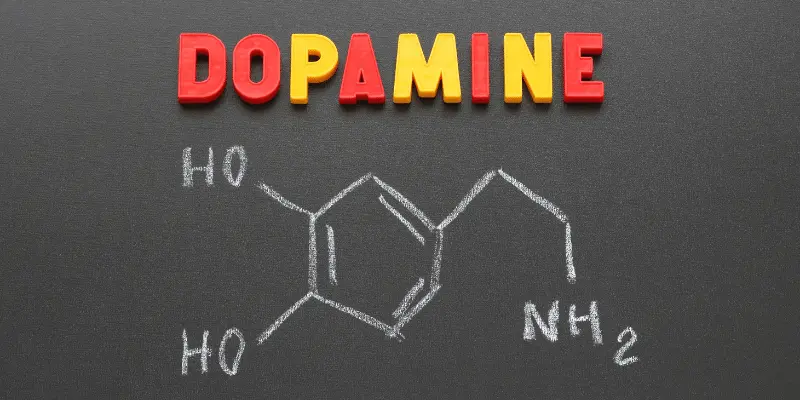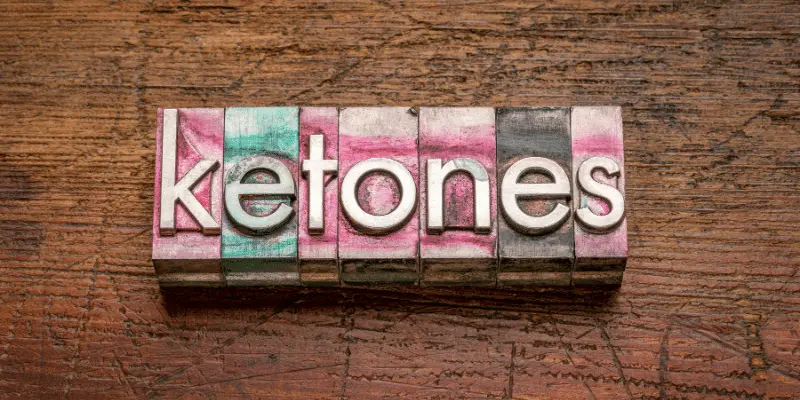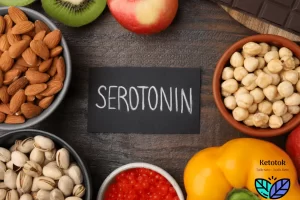The interest in the ketogenic diet has increased. It is the kind of diet that relies on high fat to burn fuel. It pushes the mitochondria to trade ketones for carbohydrates. This increases one’s brain energy levels.
Questions like ‘Does ketosis increase dopamine?’ keep popping up here and there. Well, we will soon find out.
Ketosis – Meaning and Mechanism

By definition, we can safely say that ketosis is the increase of ketone levels in the body. That is to say, when you slowly reduce the amount of carbs you eat, you are in effect experiencing the production of ketones. If you well remember, your body normally uses carbohydrates for energy. But when you have entered ketosis, your body will now use fat.
Whether ketosis benefits people or not is a subject undergoing current research. But it should be brought to your notice that it may not be suitable for everyone. But if your wish is to be inducted into this state, that is no problem at all. This blog post has you covered.
Read Also: Unlocking Ketosis: Can a 48-Hour Fast Do the Trick?
Ketosis – Not carbs, but fat for Energy
Ketosis is often used to describe a significant thing that happens in your body. It happens when your body turns to fat for energy, not carbs. So instead of glucose, there is a production of ketones. These ketones are then absorbed in the blood. They are then used as fuel.
Reaching Ketosis through a Ketogenic Diet – How?
The usual body function we know is the breaking down of ingested carbohydrates into glucose. And this happens very quickly. It does this before it taps from the fat stored in the body. Consuming low portions of carbs will make the body turn to fat to use for fuel.
To make this simpler, ketosis is defined by three stages:
- Getting into Ketosis
To enter into ketosis is not that difficult as long as you are intentional about it. All you need to do is lower how much carbs you eat. A popular diet that many people are using to reach this is the ketogenic diet. The ketogenic diet leads you into ketosis within the space of three days, except when other factors affect it.
- Keto-adaptation
This is the second stage where it is required that you adapt to ketosis. After all, your body has never experienced such a thing before. Engaging in exercises and other activities can help you prepare the body for the fat-burning mode.
- Metabolic flexibility
The third stage is the metabolic flexibility. In this stage, you maintain ketosis through the keto diet and exercise. Once you’ve reached metabolic flexibility, you will not experience much trouble when you take in a small amount of food outside the keto diet.
Getting into ketosis takes about two to three days. But there are some factors that could make it take up to a week or more. These factors include one’s age and genetic makeup.
Does Ketosis increase Dopamine? – What is the link?

For sure, the word ‘dopamine’ may sound strange. Or maybe not. It is actually something so tiny but does a huge work behind the scenes. Widely known as a neurotransmitter, it fosters communication in the brain. But it is even beyond that.
Dopamine works to promote good health. Various studies suggest that ketosis has an influence on dopamine levels in the body. We are going to see how that is so.
Dopamine and its connection with one’s Mood and Motivation
Dopamine is an active chemical that supports the brain. Any positive feeling you can think of: pleasure, excitement, and motivation, are produced by this chemical. Aside from its function as a neurotransmitter, it works as a hormone. In fact, it may also prepare your body to respond to stressful situations, attacks, and danger.
In addition to that, it causes your blood vessels to relax or constrict. It increases the removal of salt and urine from your body. It is known to reduce insulin levels in the body.
It is also part of a reward system. Let us say, for instance, you received your wages at the end of the month or you were given a special gift. No doubt, you usually feel good and excited. Be thankful to the dopamine in the brain. There could either be balanced, high, or low levels of dopamine. These are linked to anxiety symptoms and depressive effects.
Dopamine does not act on its own. It works with companions like serotonin, norepinephrine and adrenaline.
How Does Ketosis Increase Dopamine Levels? – A Simple Guide
Ketones are acids the body produces when fat is used as fuel. It is usually a signal that your body has abandoned carbohydrates and has given its attention to fat. Experts in the field of research are still finding additional answers to the question, does ketosis increase dopamine? However, some findings have been published.
It is a possibility that ketones can increase the production of enzymes that produce dopamine. Ketones can fuel brain cells thereby optimizing mitochondrial function. Mitochondria helps maintain healthy dopamine levels. Technically speaking, the more energy production in these areas, the higher the levels of dopamine.
Ketones help to alleviate oxidative stress in the body. The absence of oxidative stress can speed up the production of dopamine in the body. It is also possible that ketones can influence dopamine activity in the brain regions, that is, influence its reuptake and breakdown to promote good circulation of it around the body.
Ketones and its effect on Bipolar Disorder and Other Mood Disorders

Maybe you have or have not heard of bipolar disorder. All right, at this point, we will give you a tiny piece of information on it. It is simply a mental illness. It is accompanied by extreme changes in one’s behavior and energy level.
When someone suffers from a mental condition, energy production becomes very slow. Ketones, however, can speed up the production of energy. Moreover, people who are diagnosed with bipolar disorder often have high amounts of sodium in their cells. Ketones can help reduce the level of sodium.
Ketones help to improve the health of cell membranes which in turn improves neuronal firing. The neuronal firing means that there is a storage of nutrients in the body that will enhance the production and function of enzymes. To crown it all, it helps deal with stress in the bipolar brain.
In a study, two women who were diagnosed with Type II bipolar disorder were told to follow the keto diet. One woman was to do keto for two years, the other woman was to do it for three years. It was observed that both women experienced improvement in their anxiety and mood in contrast to the effect of medication on them. They also experienced a reduction in depressive episodes.
The Keto Diet – Therapy for Epileptic Seizures and Mental Alertness

The ketogenic diet’s rule is simple – do not eat many carbs. Carbs are replaced with fat and then you can eat a moderate amount of protein. A typical keto diet is one where a person consumes about 3-4 grams of fat for every 1 gram of carb and protein. That is to say, much of the calories that are eaten should come from fat sources.
Read Also: How Many Eggs per Day on a Keto Diet?
Keto Diet as a Treatment for Epilepsy in the 1920s – The Origin
Before now, epilepsy was treated with fasting. Not until the 1920s. At this time, modern physicians began to administer the keto diet. They used it as an alternative treatment for childhood epilepsy. There has been a growing interest in the use of it since then.
In accordance with one article distributed under the terms of the Creative Commons attribution license, a man named Wilder was said to be the first person to report on the use of the keto diet as a treatment for drug-resistant epilepsy. Improved symptoms were reported by those who followed the diet.
Reducing Epileptic Seizures and Improving Cognition
There was a recorded case report in which 10 children with seizures were placed on different treatment methods. 4 out of those 10 kids who were placed on a diet experienced reduced frequency of seizures. They even had the ability to predict when the next fit will come. Even when they discontinued the diet, their conditions were still improved.
When someone encounters an attack, neuronal firing occurs even when it is not supposed to. This is because there is a production of glutamate that spikes excitement. The keto diet increases and reduces the amount of GABA and glutamate respectively.
As we have mentioned, the keto diet supports the production of ketones. They can cross the blood-brain barrier and provide energy to places in the brain that need it. The brain also experiences reduced inflammation and injuries. Thus, we can say it improves cognition. An additional benefit is that it can reduce feelings of anxiety and depression.
Exogenous Ketones – Mental Health Booster

Just as the name implies, exogenous ketones are not the ones produced inside the body. They are outside. As a matter of fact, they are supplements produced by people. People take these supplements in order to induce ketosis. These supplements provide good fuel for the brain and improve cognition too. It can also slow down neurodegenerative cells in the brain thus improving mental performance. These supplements however do not have the same positive effect on everyone and care need to be taken before you switch to them.
What is your take? Should You Try a Ketogenic Diet?
Everywhere you go, people are either going into the keto diet, coming from it or are already into it. That is not surprising since it helps in the overall improvement of health. And as for safety…well, the ketogenic diet is safe.
But wait. Before you jump into it, know some facts. There are experts who try to steer people away from this diet and rank it as very bad. This report is not to scare you. It is to help you make the right decision.
So, should you still go ahead and try it? Below are a few things to consider:
Possible Benefits of Keto Diet for Dopamine and Mental Health
The keto diet can increase the production of metabolites such as dopamine and serotonin. The production of these assists in emotional regulation. Another one we considered in this blog post is that the diet can reduce symptoms of depression and anxiety. It also does well in acting as an anti-depressant in improving cognitive function.
Patients with Parkinson’s disease and Alzheimer’s disease can also feel better when they undergo the diet.
Long-term Challenges of Sticking to the Keto Diet
- Deficiency in nutrients
It is possible for a person who does keto to be low in essential nutrients. Why is that not possible when the diet restricts the eating of nutrient-dense foods? It is true that high-carb foods have their own downsides, but they contain minerals that the body needs. As for keto, it provides little nutrients for the body.
- Low level of blood sugar
The eating of low-carb foods in an extreme manner can cause your sugar level to drop below normal. This is very dangerous to one’s health. Low blood sugar is not a friend of anyone. In extreme cases, it can be as dangerous as leading to coma and death.
- Risk of kidney stones
High-fatty foods lead to high fatty acids. It changes the chemistry in your blood and urine. While a low-fat diet makes calcium to be glued to the blood, a high-fat diet allows much calcium to be released. You could also have high levels of triglycerides in the blood which is dangerous.
- Damage to bone health
In the long run, your bones may become unhealthy. Your bone may lose mineral density and slowly make you weak. This is not child’s play. It can lead to chronic diseases and death.
Consulting Your Doctor Before Making Major Diet Changes

Speaking to your doctor before beginning any major diet changes is important and even life-saving. If you do not have a personal doctor, you can meet any who is qualified and knows his onions. Your doctor will be able to review your medical condition and adjust the diet plan to suit your needs. Make him your best pal because you will definitely need him. Yes, you will need him as he is well-equipped to guide you through the lifestyle.
The benefits of consulting your doctor cannot be overstated. You will be able to ensure that you are on track and your diet is safe for you. You may even be amazed that your doctor will come up with something better than what you had in mind.
Read Also: Keto vs. Brain Fog: How the Diet Can Transform Your Mental Clarity
Conclusion: Effects of a ketogenic diet on Mood disorders, Bipolar disorder, Epilepsy and Mental Alertness
The main aim of this blog post was to find the answer to the question, does ketosis increase dopamine? And the answer is an affirmative yes. The keto diet helps to enhance the ‘feel good’ feeling in a person and gives the person motivation and focus to do work.
When it comes to seizures and mental issues, the keto diet is often considered to have therapeutic effects on them. It can help improve cognition and the poor emotional state of a person. It’s a bet that you may not have known these facts. Do the needful before you switch to the diet to reap its benefits.
FAQ’s:
Q. Why do I feel so much better in ketosis?
A. Feeling good in ketosis may come from the regulation of glucose levels, improvement in mood and A. concentration, and reduced inflammation.
Q. Is it really so that one’s brain works better during ketosis?
A. Ketosis may help your brain work better by reducing the risk of having neurological disorders. It can also improve neurological conditions.
Q. Why do I feel smarter on keto?
A. The brain functions at its best on ketones made from utilizing fat. Thus, feeling smarter may be due to that.
Q. In what way does ketosis affect neurotransmitters?
A. Ketosis offers neuroprotection and increases the efficiency of neurotransmitters.
Q. Does ketosis increase focus?
A. Yes, it supplies energy to the brain while at the same reducing brain inflammation and injury.
Q. Does ketosis increase GABA levels?
A. It does indeed. Ketosis increases GABA levels by enhancing energy metabolism in the brain.
Q. Can fasting increase dopamine?
A. Fasting can make you feel rewarded when you have food. In this way, it increases dopamine.
Q. I feel better when I eat low carbohydrates. Why is that so?
A. That is possible because the diet gives you energy and helps in stabilizing your mood.


